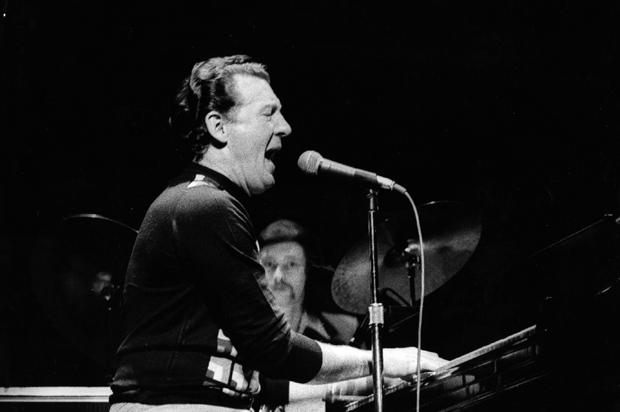‘I ain’t never pretended to be anything,’ says the man they call the Killer. ‘I’ve lived my life to the fullest, and I had a good time doin’ it. And I ain’t never wanted to be no teddy bear.’
Jerry Lee Lewis is still recording and performing at the age of 79, but his legend rests on what he did in the couple of years after he turned 21. In 1957, ‘Whole Lot of Shakin’ Going On’ and ‘Great Balls of Fire’ made him a $10,000-a-night sensation who sold more tickets than Elvis or Sinatra. Sam Phillips of Sun Records called him ‘the most talented man I ever worked with, black or white’. In 1958, Lewis torched his piano in order to outshine headliner Chuck Berry, sparked a full-blown riot in Boston and toured the UK under a storm cloud of outrage over his bigamous marriage to his 13-year-old cousin Myra. In 1959, the scandal metastasised and poleaxed his career back home. Rick Bragg isn’t exactly allergic to hyperbole, but he can be forgiven when he calls it ‘a rise and fall unequalled in American music’.
It’s a short heyday for a long life and a long book, and Bragg squeezes every last drop from it. He employs the kind of brawny, showy, sometimes hammy prose you often find in accounts of rock’n’roll’s founding fathers — Nick Tosches’s Lewis biography, Hellfire, being a classic example. These big, macho narratives can’t just be life stories; they must be parables of America itself. This is the kind of book where a paragraph begins: ‘The Spaniards came to the river in 1541.’ So Bragg can occasionally get overheated (one audience is hit ‘right between the eyes with a hot poker of rock and roll’); but then he has a high-temperature subject.
Like Elvis and James Brown, Lewis was a child of the South in the hard-scrabble 1930s. He earned the nickname ‘Killer’ long before he was famous, by trying to throttle his high-school football coach with his own necktie, and was expelled from evangelical college for playing ‘the devil’s music’. ‘Do you see what you’ve done to all these young people?’ raged the dean. ‘You’ve driven these young people crazy.’ His enemies, including his preacher cousin Jimmy Swaggart, said he was destined for hell. Lewis worried that they might be right.
Bragg vividly evokes that distant era when rock’n’roll was a catalyst for moral hysteria and a song like ‘Great Balls of Fire’ had the explosive velocity of the first missile hurled in a riot. Lewis didn’t write his hits, but he delivered them in a voice that was more raw and knowing than Elvis, all guts and groin. In Eisenhower’s America, it was an incitement as well as entertainment. Bragg is equally good at zeroing in on the telling details of life on the road, and crafting minute-by-minute accounts of Lewis’s roof-burning performances. Rock’n’roll was a small circle of friends and rivals back then, and there are walk-on parts for Buddy Holly, Elvis and Johnny Cash, who compared his record sales to Lewis’s and sighed, ‘Gee whiz, I wish I was a teen idol. It must be nice.’
The reasons for Lewis’s fall were unique but his nosedive was mirrored across rock’n’roll. Chuck Berry went to jail, Little Richard went to the church, Buddy died and Elvis joined the army. Motown and Phil Spector filled the void before the Beatles came along. But one of this difficult man’s few admirable qualities was his refusal to quit. He just kept touring, playing honky-tonk bars and county fairs for a fraction of his previous fee even when burly men sought him out, looking for a fight, or hecklers called him a ‘cradle robber’. He had no reservations about striking back, with a mic stand if necessary.
During the 1960s, Lewis became a bestselling country star and played Iago in a Shakespearean rock opera — something I would dearly love to have seen — but he didn’t make it easy on himself. Over the years, he ruined his health and voice with whisky and painkillers, brought his tally of wives to seven and maintained a long and loving relationship with firearms. He played with a handgun atop his piano and once shot his own bassist (accidentally, he insists). Eventually, in his eighth decade, he turned to God.
Lewis is a notoriously ornery interviewee and Bragg has done well to tease anything useful out of him, but the singer trades in soundbites rather than revelations or reflections. He is from the Popeye school of self-analysis: ‘I yam what I yam.’ He denies the more lurid rumours, even as he relishes his bad reputation. On the subject of Myra he insists: ‘She was a grown woman, blossomed out and ready for plucking.’ Bragg comments: ‘He does not care how that sounds, and says it, partly, just to show he doesn’t care.’
The book ultimately succeeds as a portrait of an era rather than a man, because the man is not a juicy paradox like, say, James Brown. He’s a lump of rock, blunt and unyielding. In a lovely deadpan passage, Bragg describes the time Lewis pumped 25 bullets into his office wall, wrecking the dentist’s surgery next door.
He is asked why.
He just stares blankly.
It was because he wanted to.






Comments